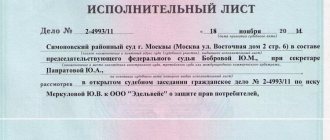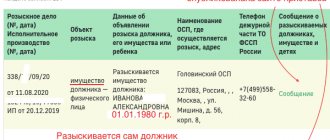Cancellation of the decision to terminate enforcement proceedings
The grounds for termination of proceedings by the bailiff are given in Art.
47 of the Law “On Enforcement Proceedings” dated October 2, 2007 No. 229-FZ (hereinafter referred to as Law No. 229). However, in most cases (with the exception of the actual fulfillment of the requirements of the writ of execution), the end of the proceedings does not mean the impossibility of continuing it after some time. If the deadline for presenting the writ of execution for collection has not expired, the decision to terminate the proceedings can be canceled both on the basis of the claimant’s application and by the decision of the superior bailiff or his deputy (Part 9 of Article 47 of Law No. 229). In such cases, the bailiff is obliged to initiate proceedings again.
In particular, the proceedings end when the writ of execution (hereinafter referred to as ID) is returned to the claimant. This can happen for various reasons (they are listed in Article 46 of Law No. 229). The most common case is the inability to establish the location of both the debtor and his property. The bailiff is obliged to draw up a report on the existence of circumstances due to which it has become impossible to execute the court decision. Along with the act, the claimant receives a resolution to terminate the proceedings.
In practice, it often happens that the bailiff does not use all the opportunities provided to him to search for the debtor and his property, i.e., simply put, he is inactive, not wanting to make efforts to collect the debt. If the claimant suspects negligence on the part of the contractor, he can file a complaint against his actions/inaction to a higher official or to the court.
If the claimant received back his writ of execution without recovery, he may not seek to cancel the decision to terminate the proceedings, but simply re-present it within the limits established in Art. 21 of Law No. 229 term. At the request of the claimant, enforcement proceedings will be re-initiated after its completion.
ConsultantPlus has many ready-made solutions, including a guide to what you need to know about enforcement proceedings. If you don't have access yet, you can get it for free, on a temporary basis! You can also get the current K+ price list.
The procedure for resuming enforcement proceedings
Resumption of enforcement proceedings may be required after its suspension and termination. The reasons for the suspension are specified in Federal Law No. 229-FZ. It also contains the procedure for resuming enforcement proceedings. Let's take a closer look at the procedure.
After graduation
The bailiff can complete the procedure if:
- the claimant's demands have already been fulfilled;
- a joint and several collection was made at the expense of several debtors (if the proceedings were combined into one);
- the claimant was returned the writ of execution;
- the debtor organization has been liquidated, and the writ of execution has been transferred to the liquidation commission;
- the debtor was declared bankrupt;
- the writ of execution was handed over to withhold periodic payments;
- the statute of limitations has expired.
If you are not satisfied with the results of the bailiffs’ work and you decide to appeal their actions, then you can resume enforcement proceedings. The main reason for the dissatisfaction is that the bailiffs did not take measures to repay the debt.
Since the conclusion on the case has already been rendered, an application for the resumption of enforcement proceedings, supported by compelling reasons, will be required. Evidence must be attached to it.
The bailiffs collected the debt “carelessly” and closed the case - submit an application to resume proceedings.
There are other cases when it is necessary to resume completed enforcement proceedings. For example, the defendant could change jobs. Accordingly, debt payments will no longer be withheld.
Sometimes debtors themselves prevent the execution of a court decision. After the end of the enforcement proceedings, they can hide their property, deliberately change their place of residence, etc.
Where to apply?
First of all, deadlines must be met. The application must be submitted to the FSSP. If the bailiffs do not resume proceedings within 10 days, then an application must be filed with the court. It is better to consult in advance with an experienced lawyer who will help you find similar examples from judicial practice. You can rely on them during the trial.
An application to resume enforcement proceedings is submitted to the FSSP or the court.
What nuances need to be taken into account when resuming enforcement proceedings?
If demands have already been presented previously, the opportunity to resume enforcement actions is allowed by law in two forms:
- re-presentation of the writ of execution;
- resumption of enforcement proceedings.
If the documents have already been returned to the claimant, he can only use the first option. The second is unacceptable in practice. If the case contains the original document, renewal is possible.
These questions are classified as difficult. Therefore, it is worth involving an experienced lawyer in their decision. He will check whether there are grounds for resuming enforcement proceedings. The lawyer will provide step-by-step instructions for solving the problem or carry out all the actions for the claimant by proxy - draw up an application, collect a package of documents, submit them to the FSSP or the court.
After termination
The court and the bailiff can terminate the proceedings. The procedure is terminated by the court if:
- the creditor or debtor died, were declared missing or dead by the court;
- it is impossible to fulfill the requirements of the writ of execution (perform any actions or refrain from them);
- the claimant refused to receive the thing from the debtor in payment of the debt, while its transfer was provided for by the writ of execution.
The bailiff terminates enforcement proceedings if:
- the court issued an act of termination of the writ of execution;
- the claimant has waived all claims;
- the parties entered into a settlement agreement;
- the previously issued judicial act was cancelled;
- the executive document was canceled or declared invalid;
- execution of a judicial act was terminated by a decision of a court or other government agency;
- the legal entity-debtor or the legal entity-collector were excluded from the Unified State Register of Legal Entities;
- alimony obligations have been terminated;
- the debt to the budget was recognized as uncollectible.
If the reason for termination of proceedings is the cancellation of a judicial act, it can be resumed at the request of the claimant and the initiative of the bailiff.
How to challenge the actions (inaction) of bailiffs?
To challenge the illegal actions or inaction of bailiffs, the claimant can complain to a senior FSSP employee. He will check the legality of the suspension of enforcement proceedings.
The following information will be taken into account:
- whether all actions to collect the debt were carried out by the bailiff;
- whether he used all the powers that the law provides;
- whether a search was carried out for the debtor, whether his place of work, the presence of bank accounts, property, and assets were clarified;
- How correctly are the acts of impossibility of collection drawn up?
If any violations are found, the cease-and-desist order will be revoked. This will be followed by the resumption of enforcement proceedings in court.
After suspension
An application for the resumption of enforcement proceedings should be submitted to the authority that previously issued the decision on suspension. This could be a court or the FSSP.
In the application for the resumption of enforcement proceedings, it is necessary to indicate all stages of the procedure - from the initiation of proceedings to suspension, list the measures taken by the bailiffs, and the reasons for the resumption.
Please attach written evidence to your application that all grounds for suspending the procedure have been eliminated. The document can be drawn up by the claimant himself or his legal representative. He will need a power of attorney certified by a notary.
Enforcement proceedings have been suspended—the use of enforcement measures is not permitted.
Resumption of production after its termination
The end of proceedings should be distinguished from its termination, since the latter does not imply the possibility of re-submitting a writ of execution for collection. Proceedings are terminated only if there are compelling reasons. Such a decision can be made, in accordance with Art. 43 of Law No. 229, court or bailiff.
The main reasons for termination include:
- in relation to individuals - the death of one of the parties (debtor or claimant), if the right of claims (obligations) does not pass to another person - the legal successor; in relation to legal entities - liquidation and exclusion of records about them from the Unified State Register of Legal Entities;
- loss of the opportunity to collect;
- the claimant’s refusal to receive property seized by the executors from the debtor or a complete refusal to collect;
- cancellation of ID;
- recognition of debt for payments to the budget as uncollectible.
How to resume enforcement proceedings after it has been terminated? The first opportunity to resume terminated enforcement proceedings is to cancel the bailiff's order to terminate it (including upon a complaint from the claimant).
Production is also resumed if (Part 3 of Article 43 of Law No. 229):
- the court decision that served as the reason for the termination of the proceedings was canceled;
- the circumstances that formed the basis for the termination of production have changed.
The initiator of renewal in this situation can be either the claimant (for this he needs to submit an application to the FSSP) or the bailiff.
How to resume suspended production
In a number of cases, enforcement proceedings may be suspended by the court or the bailiff (Articles 39–40 of Law No. 229). The main reason for resuming enforcement proceedings is the elimination of the circumstances due to which it was suspended (Part 2 of Article 42).
For the court to resume in accordance with Part 1 of Art. 438 of the Code of Civil Procedure of the Russian Federation, proceedings suspended by his decision are required:
- Submission by the claimant or bailiff of the corresponding petition.
- The actual elimination of grounds that impede the progress of enforcement proceedings.
In addition, according to Part 2 of the above article of the Code of Civil Procedure, the period for which the proceedings were initially suspended may be reduced by the court.
Resumption by the court
Analysis of Art. 39 of Law No. 229 makes it possible to determine what circumstances must be eliminated in order for the court to resume suspended proceedings.
Subscribe to our newsletter
Yandex.Zen VKontakte Telegram
The court will decide to resume proceedings if:
- a claim for the release of seized property has been refused;
- there is a result of the court considering issues related to challenging the result of the assessment of property under arrest or the collection of an enforcement fee;
- the debtor returned from a long business trip;
- the claim to challenge the writ of execution has been rejected or the procedure for challenging the judicial act under which it was issued has been completed.
The decision to resume proceedings is made by the same arbitration court that initially issued the executive document and then suspended it (Part 1 of Article 45 of Law No. 229), or by the one that is closer to the place where the performer’s activities are carried out.
Resumption by bailiff
The bailiff may suspend the proceedings if one of the parties submits a corresponding substantiated application to him (Part 4, Article 45 of Law No. 229). To resume proceedings, you will need to make sure that the grounds for suspension of proceedings have been eliminated, or receive a corresponding application from the claimant (Part 7).
Based on the analysis of the provisions of Art. 40 of Law No. 229, we summarize the information on what grounds the executor can resume proceedings:
- the debtor or claimant returned from the combat zone or stopped performing tasks during a state of emergency (clause 3, part 1);
- the debtor completed treatment in a hospital (clause 1, part 2);
- the recognition of the debtor as missing or dead due to his appearance was canceled (clause 1, part 1);
- the debtor restored its solvency and financial solvency by exiting the bankruptcy procedure (clauses 5 and 5.1 part 1);
- the period of deferment of fulfillment of the obligation granted by the court has expired (clause 6, part 1);
- the seizure of the property of the debtor organization directly involved in the production process has been lifted (clause 7, part 1);
- lack of property from the debtor - a foreign state (clause 8, part 1);
- the previously wanted debtor was found (clause 2, part 2);
- the debtor-conscript returned from the army (clause 3, part 2).
Proceedings may be suspended by senior officials of the executive service (Part 3 of Article 40 of Law No. 229) or by the court (Part 3 of Article 39 of Law No. 229) due to a complaint about the actions or inaction of the bailiff. To resume the proceedings, it is necessary that the body considering the complaint of one of the parties to the proceedings or the decision of the executor does not find grounds for suspension or receives evidence of a settlement of the situation.
On the resumption of enforcement proceedings by the bailiff, also read the ready-made decision of ConsultantPlus. If you do not yet have access to the ConsultantPlus system, you can obtain it free of charge on a temporary basis.
Grounds for renewal and its features
The main reason for resuming enforcement proceedings is the elimination of the circumstances due to which they were suspended or terminated.
The court has the right to suspend the proceedings in whole or in part if:
- a claim has been filed to lift the seizure of the property;
- the results of property valuation are appealed;
- the bailiff's demand to collect the enforcement fee is being appealed;
- the executive document itself, an act of a government agency or a court is disputed;
- the debtor went on a long business trip;
- the actions or inaction of an FSSP employee are being appealed;
- It is necessary to clarify certain provisions of the executive document.
The bailiff has the right to suspend proceedings if:
- the debtor died or was declared dead (missing) by the court;
- the court declared the debtor incompetent;
- the debtor or claimant takes part in hostilities;
- the debtor bank's license was revoked;
- the debtor is undergoing bankruptcy proceedings;
- a claim has been filed with the court to defer the payment of the enforcement fee;
- the bailiff sent a notification to the Federal Tax Service or the Central Bank about the seizure of the debtor’s property;
- the debtor is undergoing treatment;
- the debtor is being sought.
Resumption of enforcement proceedings after suspension is possible at the request of the claimant or at the initiative of a FSSP employee.
Procedure for filing a complaint against a bailiff
If the claimant has received an unsatisfactory resolution to terminate/end/suspension of enforcement proceedings, he can file a complaint. A complaint drawn up in writing according to a standard form with the necessary justification is submitted to a higher bailiff or sent to court.
After this, the body that received the complaint, within the framework of the available materials of enforcement proceedings, will study:
- whether the bailiff fulfilled his duties within the framework of the law;
- whether he sent writs of execution to all authorities to ensure the collection (to the work of the debtor-individual, to the bank to seize an account, to the tax office or the registrar to seize property);
- whether the actions necessary to search for the debtor and his assets have been completed;
- whether acts of impossibility of collection were properly drawn up.
If violations are found in the process of studying these issues, the relevant resolution will be cancelled. After this, enforcement proceedings will continue as usual.









